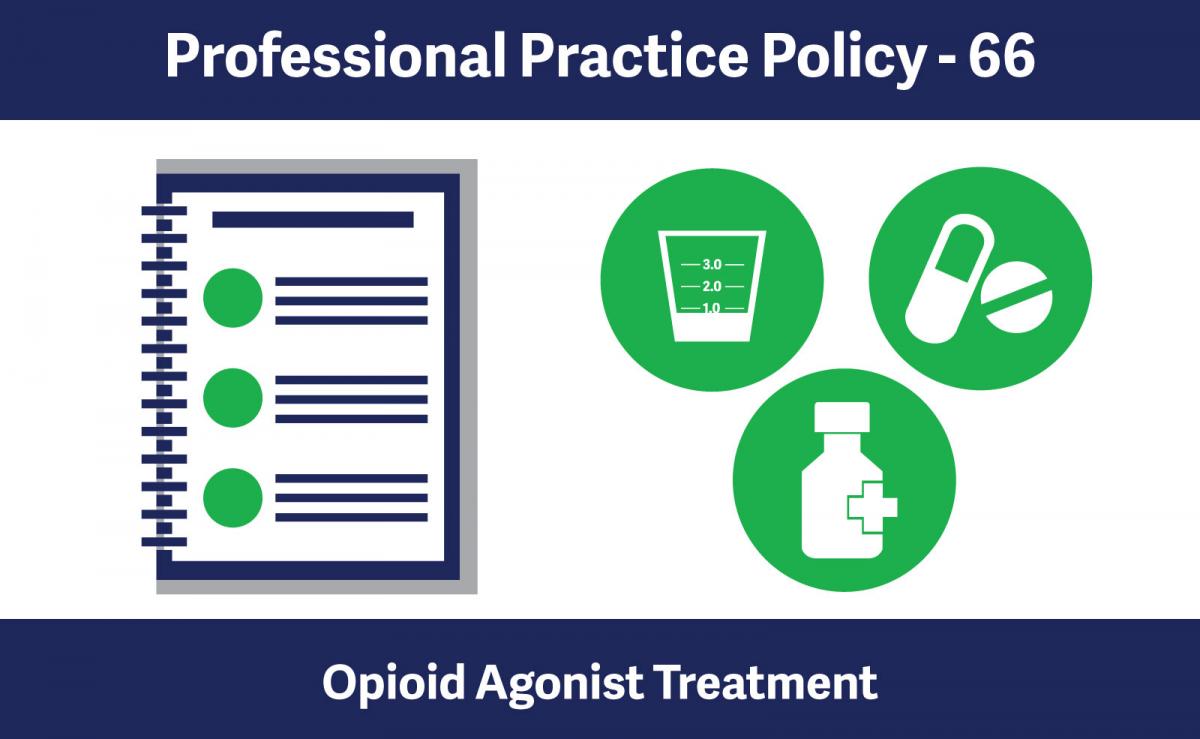PROFESSIONAL PRACTICE POLICY-66: OPIOID AGONIST TREATMENT

[Last Updated on November 22, 2023]
Professional Practice Policy-66: Opioid Agonist Treatment (PPP-66) sets out requirements for safe dispensing of drugs used to treat opioid use disorder (OUD). PPP-66 aligns with the most recent version of the British Columbia Centre on Substance Use (BCCSU) A Guideline for the Clinical Management of Opioid Use Disorder (OUD Guideline). BCCSU’s OUD Guideline serves as the provincial clinical practice guideline for all clinicians who wish to prescribe oral opioid agonist treatment (OAT) to patients with OUD.
The choice of OAT for OUD is an individually tailored process whereby clinicians discuss the risks and benefits of all three oral OAT options (i.e. methadone, buprenorphine/naloxone, and slow release oral morphine) with patients, and taking a patient centred approach, collaboratively select a medication that aligns with the patient’s goals, treatment history and other individual circumstances.
Opioid Agonist Treatment Training Requirements for Community Pharmacy
The Opioid Agonist Treatment Compliance and Management Program (OAT-CAMPP) for community pharmacy focuses on reducing stigma and expanding pharmacists’ knowledge about buprenorphine/naloxone, methadone, and slow-release oral morphine.
As of October 1, 2021, all pharmacy managers, staff pharmacists, relief pharmacists and pharmacy technicians employed in a community pharmacy that provides pharmacy services related to OAT must have completed any applicable components* of OAT-CAMPP in order to fulfill the College’s OAT training requirements as outlined in Professional Practice Policy-66: Opioid Agonist Treatment (PPP-66).
* Pharmacy technicians only need to have completed the online component of OAT-CAMPP. The content of the in-person workshop focuses primarily on clinical cases that are not as relevant for pharmacy technicians.
|
Registrants who have not completed the required training should do so as soon as possible. During the ongoing toxic drug crisis, it is in the public interest to maintain patient OAT treatment wherever possible. |
PPP-66 requires pharmacy managers to educate all non-pharmacist staff regarding their role in the provision of community pharmacy services related to OAT and document the completion of the education of individual non-pharmacist staff members.
| Opioid Agonist Treatment Compliance and Management Program |
PharmaCare requires every pharmacist at a pharmacy that provides OAT services to have completed the OAT-CAMPP training. OAT-CAMPP training is also required for pharmacies to enrol in the OAT provider sub-class and to maintain enrolment. See PharmaCare Policy Manual for more information.
Learn more about the Opioid Agonist Treatment training requirements
Note: The College’s Methadone Maintenance Treatment (MMT) training program is no longer be available.
Declaration of CompletionAfter successfully completing the College’s Opioid Agonist Treatment training requirements, submit a declaration of completion through the College’s eServices website.
|
|
The College would like to remind registrants that BC’s Registered Nurses (RNs) and Registered Psychiatric Nurses (RPNs) are able to prescribe some opioid agonist treatments (OAT) to treat substance use conditions. On September 16, 2020, the Provincial Health Officer (PHO) issued an order temporarily authorizing RNs and RPNs to diagnose and treat a problem substance use condition or substance use disorder, including by providing opioid agonist treatment and by prescribing pharmaceutical alternatives to illegally produced or street procured drugs. UPDATE: As of December 1, 2023, RNs and RPNs will be able to diagnose and prescribe controlled drugs for the treatment of OUD only if they hold an OUD certified practice designation from the British Columbia College of Nurses and Midwives (BCCNM). Nurses who are currently diagnosing and treating OUD under the PHO order must transition to the new certified practice designation. See the BCCNM website for more information.
|
Professional Practice Policy-66: Opioid Agonist Treatment
Pharmacists can reach the 24/7 Addiction Medicine Clinician Support Line and speak to an Addiction Medicine Specialist by calling:
| 778-945-7619 |
The 24/7 support line for clinicians and pharmacists is available, offering live, in-the-moment addiction medicine support while they are meeting with patients across British Columbia. Click here for more information.
QUESTIONS?
For questions about the College’s Opioid Agonist Treatment requirements, including the required OAT-CAMPP Training, please contact [email protected].
For questions related to submitting the Declarations through eServices, please contact [email protected].
 Share
Share



